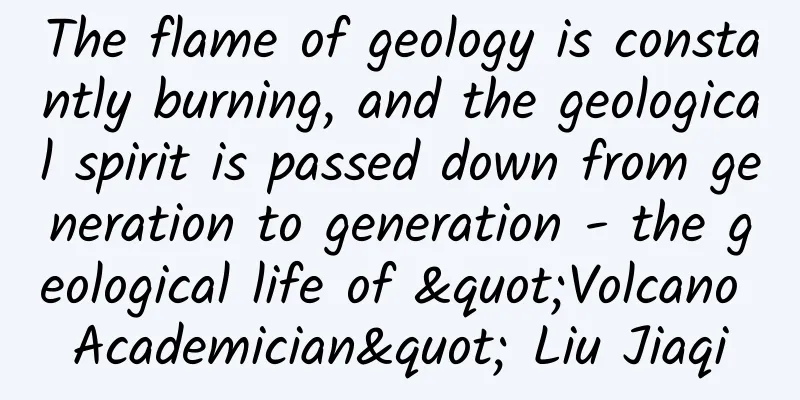The flame of geology is constantly burning, and the geological spirit is passed down from generation to generation - the geological life of "Volcano Academician" Liu Jiaqi

|
He embodies the hard-working spirit, innovative spirit, rigorous scientific research spirit and willingness to make sacrifices of Chinese geologists. This is the volcanologist: Liu Jiaqi! Written by reporter Wang Xueying, Photo and text editor Chen Yongjie ▲Academician Liu Jiaqi (Photo provided by: Liu Jiaqi) The mist was slowly flowing around us, and the sound of birdsong could be heard from time to time in the forest. The large group was moving down the winding mountain road, and just now, at the top of Changbai Mountain, the magnificent scene created by nature and time was deeply engraved in the heart of a young man like a branding iron - his name was Liu Jiaqi, and it was the first time in his life that he saw a volcano with his own eyes. A glance lasts a lifetime. This experience was like a handful of spring water, which quietly and silently awakened the seed buried deep in Liu Jiaqi's heart. As the Geological Society of China celebrates its centenary in 2022, the reporter interviewed Liu Jiaqi, a famous volcanic geologist and Quaternary geologist and academician of the Chinese Academy of Sciences. Academician Liu Jiaqi has been engaged in geological research for more than 60 years, and his footprints have spread across seven continents and five oceans. He has visited Changbai Mountain ten times, the Qinghai-Tibet Plateau seven times, the Arctic three times, and the Antarctic twice. He has visited and investigated more than 60 countries and regions, and was the first to identify the temporal and spatial distribution and rock geochemical characteristics of my country's volcanoes, bringing the research on the laws of China's Cenozoic volcanic activity to international standards. He embodies the Chinese geologists' spirit of hard work, innovation, rigorous scientific research and willingness to make sacrifices. ◆ ◆ ◆ The spirit of hard work and perseverance that never stops, and never stops striving There is a spectacular photo of foreign volcanoes hanging in the office of Academician Liu Jiaqi. As a geologist, Academician Liu Jiaqi was fortunate to see the eruption of Kilauea in Hawaii, Piton de la Fournaise on Reunion Island and Krakatoa in Indonesia, and the sceneries were unforgettable for him. Liu Jiaqi, who was born in 1941, did not have an easy starting point in life: he lost his father at a young age, had many brothers and sisters, and came from a poor family. Although he was a good student, Liu Jiaqi, who was well aware of the difficulties of his family, decided to apply to any school that offered no money or little money when taking the college entrance examination. Changchun Institute of Geology, which implemented the "five guarantees" policy (food, accommodation, study, books, and medical care), became his best choice. ▲Academician Liu Jiaqi is conducting an expedition in Antarctica (Photo courtesy of Liu Jiaqi) Fate quietly tied Liu Jiaqi's life and geology together, but at the same time it also set many challenges for them: When he first entered university, the young Liu Jiaqi never dreamed that not having enough food would become the biggest problem he would face while studying in an ivory tower. It turned out that the country was in a special period at that time. The staple food in universities was insufficient, and there was little oil in the side dishes. Students often had breakfast and were hungry again in the second class... In this long-term state of hunger, reading and studying seemed to have become a luxury. On the one hand, there was heavy schoolwork, and on the other hand, there was long-term hunger. For young people in their twenties, this was undoubtedly painful. Some people chose to skip classes because they couldn't stand it, and some even chose to drop out directly. Is this hardship? Of course it is! But for Liu Jiaqi, who has been used to suffering since childhood, this kind of "hardship" does not seem to be a hardship at all - compared to not having enough food, as long as he can continue to go to school, there is no hardship that he can't bear or endure! Not only that, facing the dual pressures of study and life, Liu Jiaqi not only endured this hardship, but also made fun of it and expanded his extracurricular life as much as possible. From serving as the editor of the college's "College Student Bulletin Board" to trying to squeeze out time to help his classmates with their homework, Liu Jiaqi always maintained an optimistic attitude and passed on his positive emotions to more people around him. ▲Academician Liu Jiaqi at the Great Wall Station in Antarctica (Photo courtesy: Liu Jiaqi) Every step in life counts. It is the spirit of "finding joy in hardship" cultivated during the school years that silently nourished Liu Jiaqi's heart in the driest years thereafter, supporting him through the turbulent years, and becoming the invisible driving force for his continuous struggle in the new journey of life. Since then, this spirit of geologists who are not afraid of hardship, willing to endure hardship, never give up, and never give up has been deeply imprinted in Liu Jiaqi. ◆ ◆ ◆ The innovative spirit of daring to try and forge ahead In the eyes of many people, Liu Jiaqi is a person who likes to "play by his own rules" - he refuses to be content with the comfortable life of the status quo and is not afraid to challenge the "impossible" in the eyes of outsiders. In 1978, the country resumed graduate student enrollment. Liu Jiaqi, who was already 37 years old at the time, came to an important crossroads in his life: five years ago, he was transferred to the Institute of Jilin Metallurgical Geological Exploration Company as the director of the isotope geology research laboratory. As a business backbone, should he choose to be content with the status quo and stop in his comfort zone, or pursue further studies and create more possibilities? What many people did not expect was that Liu Jiaqi resolutely decided to give up the comfortable status quo - his obsession with "learning for practical use" and his yearning for new knowledge, new theories, and a new world all inspired him to study for a master's degree and explore a broader world. He wanted to continue studying with Hou Defeng, director of the Institute of Geology, Chinese Academy of Sciences! ▲Academician Liu Jiaqi is conducting scientific research in Antarctica (Photo courtesy: Liu Jiaqi) However, although the opportunity to return to school was precious, fate did not forget to set challenges for him: not only were the living conditions difficult - the dormitory was cold in winter and hot in summer, eight people in a room, flies and rats were everywhere, and even studying was stressful: it turned out that he only had a basic knowledge of Russian before entering school, but now he had to learn English from ABC. For a middle-aged man in his 40s, this challenge was not small, but the spirit of "not fearing hardship and not giving up" in his youth once again ignited Liu Jiaqi's fighting spirit - he did it, he completed this challenge that outsiders thought was "impossible to complete". "It usually takes 22 years for others to get a doctorate from elementary school, but I studied in school for 27.5 years... So I have to live my 37 years as if I were 27, and I have to be perseverant and work hard." Liu Jiaqi still feels deeply moved when he recalls his years of studying. As life has taught him, the only thing harder to cross than a mountain is fear itself, and the only thing harder to cross than an ocean is oneself. Hardships and difficulties will lead to success. "People should take control of their destiny as much as possible during the process of growing up," he said. "You will encounter many choices in life, but no matter when, you should not be tempted by temporary comfort, wealth, and power, and you should not be discouraged by your lack of social resources." For geologists, every mountain and every piece of land means new unknowns and new possibilities. Liu Jiaqi has used his actual actions to tell generations of future generations that there is no road longer than the feet, no mountain higher than the people, and only by daring to challenge can the impossible become possible. During his continuous study and investigation, Liu Jiaqi quickly absorbed new knowledge like a sponge, and his horizons were slowly expanded through constant exploration and learning. It was also during this stage that the seeds of innovation that dared to break through and try were taking root in his heart, and he began to constantly ask himself a question: Can I make something new? In the 1970s and 1980s, my country's overall scientific and technological level was still lagging behind that of foreign countries, and there were still large gaps in the field of geological research that needed to be filled by the younger generation of talents. Faced with this situation, the ambitious Liu Jiaqi deeply realized that if he wanted to make a breakthrough internationally, he must first have his own "things", and if he wanted to do scientific research well and produce results, he not only needed a solid theoretical foundation, but also keen innovation. ▲Academician Liu Jiaqi in the laboratory (Photo provided by: Liu Jiaqi) Even though he was still in the postgraduate study stage, Liu Jiaqi still made a very risky decision at the time - he wanted to use isotope chronology and geochemistry to study the Cenozoic volcanic activity in Changbai Mountain and even the entire Northeast China. There was almost no precedent for this in China at the time, and it was truly "crossing the river by feeling the stones". Can it be done? How to do it? Where to get the data? ... From teachers to friends, the voices of "dissuading" came like the sea, but these good intentions and concerns did not make him back down - what supported Liu Jiaqi's "boldness" was not "adventurism", but a solid foundation. "Compared to other students, I was considered an 'old student' at that time. I already had a lot of research foundation, so it was impossible for me to do some very general topics." Whenever Liu Jiaqi thinks of his decision at that time, he never thinks it was a risk, but rather a natural innovation: if there is a lack of data, he will collect first-hand information, and if there is a lack of theory, he will establish a new system - you have to fight a war with preparation, and walk on the road that no one has walked before. "If you don't take a chance at that time, you will have no chance." Today, Liu Jiaqi has become a leading figure in the research fields of volcanoes, Quaternary research, and Antarctic and Arctic expeditions in my country. The data and conclusions he gave in his master's and doctoral dissertations have become basic materials for peer research, and are still being cited by countless descendants today... It was the "greenhorn" challenge in the eyes of others that created the new sail that guides future generations today. Choose a direction, occupy a field, master a method, and solve a problem. For decades, Liu Jiaqi has been practicing his scientific beliefs with one challenge after another, and one attempt after another. Innovation is the soul of science and the soul of career. To do scientific research, one must have an innovative spirit that is not afraid of the unknown and dares to challenge. In China, one of the most important qualities a geologist should have is an innovative spirit. Using basalt (a type of volcanic rock) to draw fibers is also an important research project of Liu Jiaqi. In Liu Jiaqi's office, there are some seemingly ordinary stones, and in a sample book on the table, there are fiber threads, cloth pieces, rods, etc. that are "drawn" from these inconspicuous stones... "This kind of stone is everywhere, and now we just use it to pave roads." Liu Jiaqi could not hide his excitement when showing these samples to reporters. He said that these "magical" inorganic silicate fibers have high performance such as heat resistance, flame retardancy, insulation, sound absorption, tensile strength and corrosion resistance, and have broad application prospects in aerospace, aviation, military, fire protection, construction, transportation and other fields. "It is useless to stick to the old ways. Now is the time for innovation!" Liu Jiaqi said with emotion: "China has so many geological relics and natural environments, as well as incomparable human history and activities. These are all important sources for innovation in Quaternary science and earth science. Now we are more qualified and capable of making innovative contributions to China's earth science, and we should not just indulge in publishing a few articles and winning a few awards." Only by walking the path that no one has walked before can you see the sky that no one has seen before. This is Liu Jiaqi's breakthrough spirit, and it is also a microcosm of generations of geologists in New China - they have both the strength to forge ahead and the courage to innovate! ◆ ◆ ◆ Bold, careful, down-to-earth and rigorous scientific research spirit In the eyes of many people, "hardship" is the norm in the life of every geologist. Traveling through mountains and rivers for field surveys has long been commonplace, but the potential risks and huge challenges faced during this period are by no means something that ordinary people can imagine. ▲Academician Liu Jiaqi inspecting a volcano (Photo courtesy of Liu Jiaqi) In 2000, Liu Jiaqi traveled to Indonesia to investigate the Krakatoa volcano. Investigating volcanoes is the most routine task for geologists, but the task was not so simple: it turned out that the Krakatoa volcano was not peaceful at that time, and the volcano, which was in an active period, would smoke and gas from time to time. As professional geological expedition personnel, the team experts naturally wanted to go to the crater area to observe the volcano up close, but would it be risky? After weighing the pros and cons, the team decided to seize the opportunity and head to the top of the mountain. Climbing all the way, when they were less than 100 meters away from the crater, something unexpected happened - the ground began to shake. "Oh no, it's going to be an earthquake!" Liu Jiaqi quickly realized that there was a deeper meaning behind this sign - earthquakes are generally a precursor to volcanic eruptions... Krakatoa is likely to erupt! At this moment, Liu Jiaqi and many foreign experts were less than 100 meters away from the crater. If the volcano really erupts, not to mention that the high-temperature magma that gushes out is a fatal threat, the rubble and volcanic ash that will be ejected at the same time will also fall down all over the place, and it is impossible to avoid it. Thinking of this, Liu Jiaqi said nothing and quickly evacuated with the team experts. "There are indeed several colleagues in our field who unfortunately died in the volcano," Liu Jiaqi said. For geologists, taking close-up measurements of the temperature of volcanic lava is a job, but few people know that Liu Jiaqi's dangerous experience of escaping death at Krakatoa is not an isolated case. "In fact, I have personally experienced volcanic eruptions five or six times, such as the Fournaise volcano on Reunion Island, France. We not only sampled the temperature of the lava, but also measured the rocks ejected from it... and Mount St. Helens, which is more than 100 miles away from Seattle. We even took a helicopter to the pass to investigate." Whenever asked about his dangerous experiences, Liu Jiaqi seemed calm: "It was exciting and dangerous, but also exciting." In his opinion, geologists are bound to encounter dangers when doing geology, so geologists must be bold and careful at the same time. "On the one hand, we must be aware of the possible dangers, and on the other hand, we must also know when there may be dangers and how to avoid them. When working in the field, it is necessary to be brave, but it does not mean that you have to take risks fearlessly. Taking risks is a foolish action, and being brave requires us to stay calm at all times and have the ability to deal with them." Liu Jiaqi often tells students that people who do geology are people who do natural sciences. "In a sense, it is impossible to do without dealing with nature, and it is even more impossible without practice." In recent years, with the continuous development of science and technology, more and more advanced instruments and equipment have provided great help to scientific researchers, but at the same time, they have also put forward higher requirements for geologists: they can make full use of the development of science and technology, but they cannot rely on science and technology blindly. To be a qualified geologist, you must have solid basic qualities. Over the past few decades, Liu Jiaqi has led the team to climb mountains and conduct surveys in person. He has searched for a lost logistics vehicle in the uninhabited area of Hoh Xil and fell in the Keriya River and was almost washed away. Whether it is the polar regions far away from modern technology or the uninhabited craters, Liu Jiaqi has demonstrated the excellent qualities of Chinese geologists with his actual actions - bold and careful, down-to-earth. To have a tiger in your heart and a rose in your nose is undoubtedly the best portrayal for every geologist. ◆ ◆ ◆ Enthusiastic about popular science, courageous and willing to take responsibility In the constant exploration and struggle, Liu Jiaqi is now a well-deserved leader in the field of geomorphology and Quaternary geology in my country. In the field of volcanic research, he has completed a large number of systematic and original results, pushing the research on the laws of volcanic activity in my country to the international level, studying the formation mechanism and distribution law of volcanic oil and gas reservoirs, and pioneeringly expanding the new field of oil and gas reservoir exploration in my country. At the same time, under his strong promotion, my country's basalt fiber industry has been vigorously developed in the "integration of production, learning and research", and has played an important role in promoting the local economy... Liu Jiaqi is an outstanding scientific researcher. At the same time, he is also an active promoter of science popularization, leading young people with the light of science and igniting the fighting spirit of young people with the enthusiasm of science. In the eyes of many people, it is a bit of a waste of talent to let academicians do science popularization for primary school students, but Liu Jiaqi firmly denied this. "Science communication is also the vocation of scientists, and science popularization plays a very important role in purifying society," he said: "If we take the initiative to give up the space for science popularization, then pseudoscience will quickly occupy the space of the public." In Liu Jiaqi's view, every conscientious scientist should also have the obligation to shoulder this social responsibility and historical responsibility and make due contributions to science communication and science popularization. Since the end of last year and this year, two volcanoes in Indonesia and Tonga have erupted one after another, making volcanoes a hot topic. As a senior "volcano UP host", Liu Jiaqi obviously has more topics to share with young netizens on Bilibili. "Hello, fellow Bilibili students. I am Liu Jiaqi from the Institute of Geology and Geophysics, Chinese Academy of Sciences. Hello, kids." Liu Jiaqi's popular science videos always begin with this greeting, calling netizens "kids." In the video, he has a kind and friendly smile, which makes people feel no distance from such an academician of the Chinese Academy of Sciences. ▲Academician Liu Jiaqi shared volcanic knowledge with netizens on Bilibili (Photo courtesy: Liu Jiaqi) Academician Liu Jiaqi has already gained 188,000 followers on Bilibili after just over half a year. "In fact, I didn't know much about Bilibili at first, but later my colleagues introduced it to me. I learned that it is a new form of scientific communication, and it is relatively novel and vivid, covering a wide range of areas, and is more recognized by the public, so I also joined Bilibili. Soon I found that there are indeed many children and young people who love science on this platform, and there is a lot of interaction, which makes me very happy." For the audience who are familiar with him, Liu Jiaqi's science videos are full of "dry goods", but they are not boring and rigid narrations. Instead, they are rich in pictures and texts, lively and vivid, with a lot of video materials and vivid little animations, which make people fascinated by listening unconsciously and feel that they have not had enough when the end. So, does it mean that academicians with huge knowledge reserves do not need to make any preparations in advance to popularize science for ordinary people, especially primary and secondary school students? Is it definitely a piece of cake? Liu Jiaqi's answer is no. "It is easy to do popular science, but it is difficult to do it well, because it is necessary to keep improving the popularized scientific knowledge and there must not be any inaccuracy, otherwise it will mislead the audience," Liu Jiaqi said. "In addition, there must be different levels and contents for different groups of people such as children, the elderly, students, and cadres. Therefore, to a certain extent, the difficulty of popular science work is higher than that of scientific research work, and it requires us to have a spirit of dedication." ▲Academician Liu Jiaqi in his office (Photo courtesy: Liu Jiaqi) Being enthusiastic about popular science requires not only passion, but also a genuine love from the heart of the scientific researcher - for science, for the people and even for the entire country. In this way, with a sincere heart to give back to society, Liu Jiaqi has never thought of "giving up popular science work" over the years, no matter how busy he is at work. If you keep thinking about something, it will definitely be remembered. Nowadays, Liu Jiaqi has a new identity among the children - dear Grandpa Liu. For the "little fans", "Grandpa Liu always has a lot of vivid and interesting stories", "I especially love to listen to Grandpa Liu's lectures, they are very attractive", "Such difficult knowledge, I can easily understand it after Grandpa Liu's lectures"... As a "lovable" popular science expert in the earth science community in the hearts of children, Liu Jiaqi not only taught the majority of young people a lot of valuable knowledge, but his experiences and stories are also like a book that can never be finished. In the mouth of this serious and sincere reader, he deeply attracted the children and led them to approach nature, geology, and volcanoes. The flame keeps burning, the geological spirit is passed down from generation to generation, the students educate the world without saying a word, and his heart remains firm despite all the hardships he has experienced. This is the Academician of Volcanoes: Liu Jiaqi! Produced by: Science Central Kitchen Produced by: Beijing Science and Technology News | Beijing Science and Technology Media Welcome to share to your circle of friends Reproduction without authorization is prohibited |
<<: Where to watch whales in China?
Recommend
Foreign trade tips | SNS marketing methods
Although social media tools vary and marketing me...
LeTV Sports is going out of business after losing its core copyright
The lack of follow-up funds has broken down LeTV ...
Today, I pay tribute to the dreamers in the rice fields!
Source: China Science and Technology Museum The c...
Interpreting the universe! This "powerful" astronomical telescope sets a new world record!
Produced by: Science Popularization China Author:...
Android tracking technology analysis
1. Tracking is a method of collecting data from w...
How did the first batch of seed users of the product come from?
Many startup products are struggling to find the ...
The whole practical process from 0 to 1 growth!
Before I came into contact with the working metho...
Analyze the differences between Zhihu and Jianshu from five dimensions of communication and channels!
Zhihu and Jianshu seem to be completely different...
If women stay up past 12 o'clock, they will secrete testosterone and become more masculine? The truth is...
"If girls don't sleep past 12 o'cloc...
Heart regeneration is no longer a dream? Please "patch" the failing heart
The heart is one of the most important organs in ...
APP Promotion Operation Manual Complete Strategy
Starting from the position of mobile Internet mar...
KOL marketing IPization!
This is a golden sentence said by the star Ning J...
The Economist: In January 2024, the rise of DeepSeek triggered a boom in China's AI industry, and the Hang Seng Technology Index rose by more than 40%.
The Economist published an article titled "T...
The long-awaited iPhone 9 returns to the classic appearance and will be released in April!
On March 27, well-known digital whistleblower @Jo...
Inquiry on the investment price of Bozhou Moving Mini Program. How much is the investment price of Bozhou Moving Mini Program?
Starting a business requires costs, and mini prog...









